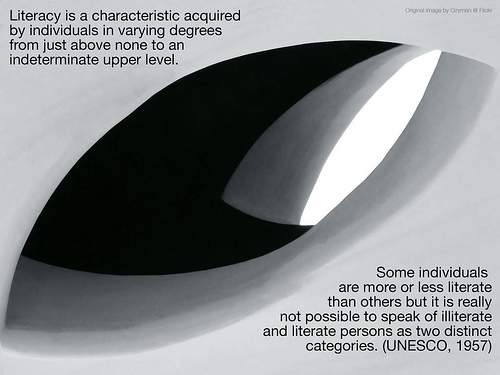Meeting with Ed.D. thesis supervisor: the roadmap for 2010.
CC-BY-NC raffyd
I met (via Skype) with my Ed.D. thesis supervisor, Steve Higgins, last night to discuss my progress over the last couple of months. Regular readers interested in my thesis (What does it mean to be ‘digitally literate’?) will already know that it’s available online as I write it at http://dougbelshaw.com/thesis. Here are the relevant posts that make up the parts of my thesis we discussed:
- Why digital literacy != the ‘aftermath’ of literacy
- Ed.D. Thesis snapshot: towards a bedrock definition of literacy
- Affinity spaces, secondary orality & digital epistemologies
- A useful way to categorise educational technologies
- The history of ‘new literacies’
- ‘Information literacy’: its history and problems
- The future of my Ed.D. thesis
- The evolution of communication
I had several things I wanted to raise, namely:
- The structure of my third section: I want to include an analysis of policy documents from various countries and outline a definition of ‘digital flow’. Possible?
- This definition of literacy that I developed after an analysis in the early stages of my literature review:
Literacy involves the mastery of simple cognitive and practical skills. To be ‘literate’ is only meaningful within a social context and involves having access to the cultural, economic and political structures of a society. In addition to providing the means and skills to deal with written texts, literacy brings about a transformation in human thinking capacities. This intellectual empowerment happens as a result of new cognitive tools (e.g. writing) or technical instruments (e.g. digital technologies).
- Whether he considers ‘affinity spaces’ to comprise of networks or groups of people (or whether they are ‘third spaces’)?
- Which modern-day Pragmatist thinkers should I be reading in preparation for writing my methodology section? (e.g. Richard Rorty)
- Is it worth spending time looking at ‘media literacy’ separately (as I have done with ‘information literacy’), or should I simply insert it as part of the evolution of ‘new literacies’?
Steve thought my roadmap seemed sensible, but that I needed to be aware of times at which I would have more/less time to write. Writing the section on the history of new literacies now is fine, but I’ll have to (as I was going to) make sure I’m up-to-date on the latest thinking surrounding ‘digital literacy’ in late 2010.
One of the most exciting aspects of my thesis is how I’m going to publish it. Steve and I are both of the opinion that (only) publishing it in a traditional way would be somewhat anachronistic. Instead, we’re going to think of ways in which my thesis is very much a ‘digital text’. This won’t be an easy option by any means as I will have to balance author intentionality (i.e. what I’m trying to argue) with reader freedom (i.e. to ‘jump around’ the text). I’m going to finish the traditional version first, but have at the back of my mind the digital version. Steve suggested I might want to ‘tag’ sections to help me do this.
Whilst Steve maintained that he’s no problems with ‘the quality or quantity’ of my work, we need to think about how we’re going to prove that it’s an original contribution to knowledge. Suggested ways included:
- Synthesizing of different conceptions of literacy.
- Proposing a new definition (‘digital flow’)
- My method of publication (digital text)
Steve sees a couple of journal articles in the third section of my thesis – perhaps one on analysing policy documents (how ‘digital literacy’ is used as a construct/aspirational term) and then another on how this helps flesh out economic policies, etc.
I then brought up the concept of ‘digital flow’ and how I could use this as a separate lens through which not only to analyse policy documents, but to consider concepts such as ’21st century skills’. There may be something, Steve said, in synthesizing policy presentations of what the ‘digital future’ is going to be like. He reminded me that it’s not just country-specific policy documents I should look at but European Commission, OECD papers, etc. A PhD student of Steve’s is doing a review of the ‘digital divide’ in China which may be useful (to compare, for example, with Futurelab’s report).
The definition of ‘literacy’ (above) that I came up with in the introduction to my thesis seemed reasonable to Steve, although he’s going to have another look at his leisure. He brought up the important point that ‘literacy’ can bring about a transformation in human thinking capacities. I linked this to the reading I’ve been doing of Ong and McLuhan – especially the latter’s belief that:
We shape our tools and afterwards our tools shape us.
There is something beyond ‘reading’ digital texts and manipulating information – how does this alter cognitive structures? Although we both don’t like her conclusions, Steve suggested that looking at some of Professor Susan Greenfield‘s work. I could speculate about longer-term influences here and perhaps link it to my conception of ‘digital flow’. I need to have a realistic conception and presentation of this rather than re-iterating a polarisation (good/bad) of the debate as it currently stands.
We then moved on to the concept of ‘affinity spaces’. I explained how I was interested in these but wasn’t sure whether they were networks, groups or something different. Steve is going to get back to me with some pointers for further research. He did point out, however, that it is usually theorised in terms of ‘cultural spaces’. Each affinity space has its own cultural norms and practices, usually understood by reference to activity theory. I mentioned how these are often ‘third places‘ and that this blurs traditional boundaries. Steve mentioned how the ‘continuity of contact’ that social networking services and affinity spaces provide changes social interactions but also conceptions of identity. He suggested a distinction between ‘temporary spaces’ (not enduring, provisional) and ‘parallel spaces’ (contact maintained over time). It may be interesting to examine the status literacy and ‘digital flow’ in relation to these.
In terms of Pragmatist philosophers and thinkers that I need to make sure I’ve read, Steve suggested Quine in addition to Rorty. He also mentioned Mead (although this strays into anthropology) and perhaps Merleau-Ponty. Pragmatism itself is always presented from a certain point of view – for example, Rorty tends towards right-wing libertarianism. I asked whether there was a collection of articles on Pragmatism that Steve recommended. He’s going to look for this, but also picked Gutting’s Pragmatic Liberalism and the Critique of Modernity from his shelf as one I could look at. I should also look at Neopragmatism and its influences.
I then suggested that I should write my introduction, set out my stall, and then go about explaining my methodology in depth. Steve agreed, stating that this should be a justification of my approach to the thesis and include underpinning epistemologies. He outlined the difference between ‘necessary’ and ’empirical’ epistemologies – i.e how things ‘should be’ versus how they actually are. This is something I need to explore further, but Steve said that it was perfectly possible to have a strongly empiricist or realist epistemology in a digital world. He cited Tim Berners-Lee, the ‘father of the internet’ as someone who had a traditional view of the exchange of knowledge.
This reminded me of a debate I’d heard on Radio 4’s Start the Week about Wikipedia and its history. Steve talked about the role of the expert and the fact that there is in fact some type of hierarchy within Wikipedia. He related this to Peirce‘s idea of a ‘community of enquirers’, explaining that what Peirce had in mind in terms of 19th century Boston wasn’t quite the same in digital, hyperconnected spaces. Steve continued to state that there is an elision underpinning Wikipedia: the notion seems to be that knowledge is not tied to context and intention, whereas we always know something for a purpose. How ‘disinterested’ in information/knowledge can you be, asked Steve, if you’ve chosen to write about it for free? (Platonic forms don’t exist!)
After this I brought up my question surrounding the concept of ‘media literacy’ – should I incorporate it within a history of ‘new literacies’, or would it be better to consider it by itself? Steve’s response was really useful and enlightening. He said that media literacy was ‘quite a meaty chunk’ and was probably worth considering by itself. Whilst analysing ‘information literacy’ has allowed me to get a handle on the ‘literacy’ part of ‘digital literacy’, an analysis of media literacy would allow me to look at the ‘digital’ part. What he meant with this is that information literacy is predicated upon the neutrality of information/knowledge, whereas media literacy recognises communicative intent. A comparison of these against various definitions of digital literacy would be Pragmatic with a capital ‘P’.
Steve warned that I need to be careful how far down the media literacy rabbit-hole I go, as there are many forms – film, TV, radio, etc. I suggested that I should look at the work of (for example) Negroponte and Tapscott (especially the latter’s Growing Up Digital and Grown Up Digital). Steve suggested that there are two main conceptions of ‘digital’:
- Similar messages communicated in different ways (e.g. film/poem, text/graph)
- Translatability – moving things across different contexts
I mentioned how the latter could be conceived of as a ‘networked literacy’ and could be linked to ‘digital flow’. Steve agreed, mentioning how nowadays things ‘spill out across contexts’. We linked this to mashups and memes.
To conclude, Steve talked about how the level and detail of what I’m looking at is complex. I therefore need to think about how the reader is going to scaffolded through this, to impose a structure to help the reader understand. I could have alternative routes through the structure (through the use of hyperlinks) but then readers could lose the intended structure. As a result, I will need more scaffolding than usual and keep going over my arguments. I noted that I’ve already started doing something like this by writing my thesis on Google Docs but taking out blog posts that need to stand by themselves. Steve re-iterated that a potential contribution to new knowledge could be a synthesis of the ideas and form of my thesis.
We’re going to be looking at potential external examiners in 2010. Steve’s currently thinking someone from the London Knowledge Lab or similar – someone who ‘can deal with’ presenting my thesis as a digital text.
Steve and I will be meeting (via Skype again – it works well for us) in about a month’s time. I’m going to consider the 3 (or so) main points I want to make in my thesis, as I will need to reference these throughout the digital text by way of scaffolding. At the moment, I’m thinking that two of these will be:
- Digital literacy is not useful term to use as consensus cannot be reached.
- Digital flow is a useful for conceiving of post-21st century skills.
Finally, Steve’s invited me to meet up with a couple of his other doctoral students who are working in similar areas to kick around some ideas. I look forward to it! 😀




![Reblog this post [with Zemanta]](http://img.zemanta.com/reblog_e.png?x-id=53f7fc0a-025d-4a6d-a6b8-7a4a323ccb82)